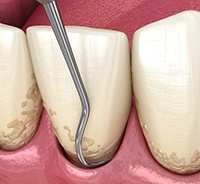Periodontal Treatment – Auburn, ME
Stop Gum Disease In Its Early Stages
Gum disease (also known as periodontal disease) is the leading cause of adult tooth loss here in the United States, as well as one of the most common health disorders period on the planet. This infection often goes unnoticed in its earliest stages because the symptoms are very minor, such as light bleeding following brushing and flossing and oral tissue that appears puffy or redder in color.
At Willow Run Dental Association, our team strives to identify and treat gum disease in the earliest stages possible for the sake of our patients’ continuing wellbeing. That’s why periodontal screenings are an essential part of every dental checkup and cleaning. If we do discover worrisome signs of an infection, dedicated therapy is available to eradicate harmful bacteria and revitalize oral health. Do you have any questions? Do you suspect that you may be in need of treatment? You are always welcome to contact us in Auburn, ME for further information.
Do I Have Gum Disease?

Common symptoms include the following:
- Gums that regularly bleed when brushing and flossing
- Gum tissue that is excessively red in shade, swollen, or tender to the touch
- Excessive bad breath that lingers even after practicing oral hygiene
- Teeth that feel looser or seem to be separating
- Areas of pus forming between the gums and the teeth
- Teeth that appear longer over time (a sign of a receding gum line)
- A sudden shift or change in the way the rows of teeth fit together
Scaling & Root Planing

When a regular dental cleaning is simply not intensive enough to get rid of the harmful bacteria that cause gum disease, scaling and root planing is often the logical next step. This in-depth treatment involves the dedicated removal of harmful bacteria from along your gumline and beneath it too. Our team will also pay specific attention to the tooth roots themselves, which develop rough surfaces over time that are prime targets for plaque and tartar accumulation. By smoothing these vulnerable areas and providing a thorough cleansing, we can minimize the risk of further flare-ups of infection.
Do You Need Scaling & Root Planing?

In very mild cases, gum disease is reversible via a regular dental cleaning and thorough at-home oral hygiene. However, scaling and root planing (SRP) is often necessary. You might need this treatment if you are exhibiting symptoms of gum disease, such as:
- Persistent bad breath
- Swollen, puffy gums
- Gums that bleed easily when you brush and floss
- Gum recession
After a thorough examination, our team can let you know whether SRP would fit your unique situation.
The Process of Scaling & Root Planing

Depending on the extent of your required treatment, SRP may take place across one or more appointments.
The first stage of treatment is scaling. We use special instruments to remove plaque and bacteria from both above and below the gumline. We often use local anesthesia to make this process more comfortable.
The second stage of treatment is root planing, during which we smooth out the roots of your teeth so bacteria will not easily cling to them.
Aftercare Tips for Scaling & Root Planing

Because SRP is a rather intensive treatment, it can ta e up to a few weeks for any lingering soreness and sensitivity to go away. In the meantime, you can reduce discomfort by taking some simple steps:
- Regularly rinse your mouth with warm salt water.
- Be very gentle when brushing and flossing your teeth.
- Avoid hot and spicy foods.
- Eat only soft foods for the first 48 hours after your treatment.
- Do not smoke or chew tobacco.
- Get enough rest.
Antibiotic Therapy

Following scaling and root planing, our dentists may recommend the application of antibiotics as well to supplement the positive effects. We prescribe ARESTIN®, which comes in the form of a powder that is directly applied to the patient’s deep periodontal pockets. The substance contains microspheres that aren’t actually visible to the naked eye but will release medication over a gradual period of time, eliminating any bacteria that were missed during the initial treatment process. ARESTIN’s benefits can last for up to a full month following your appointment.
